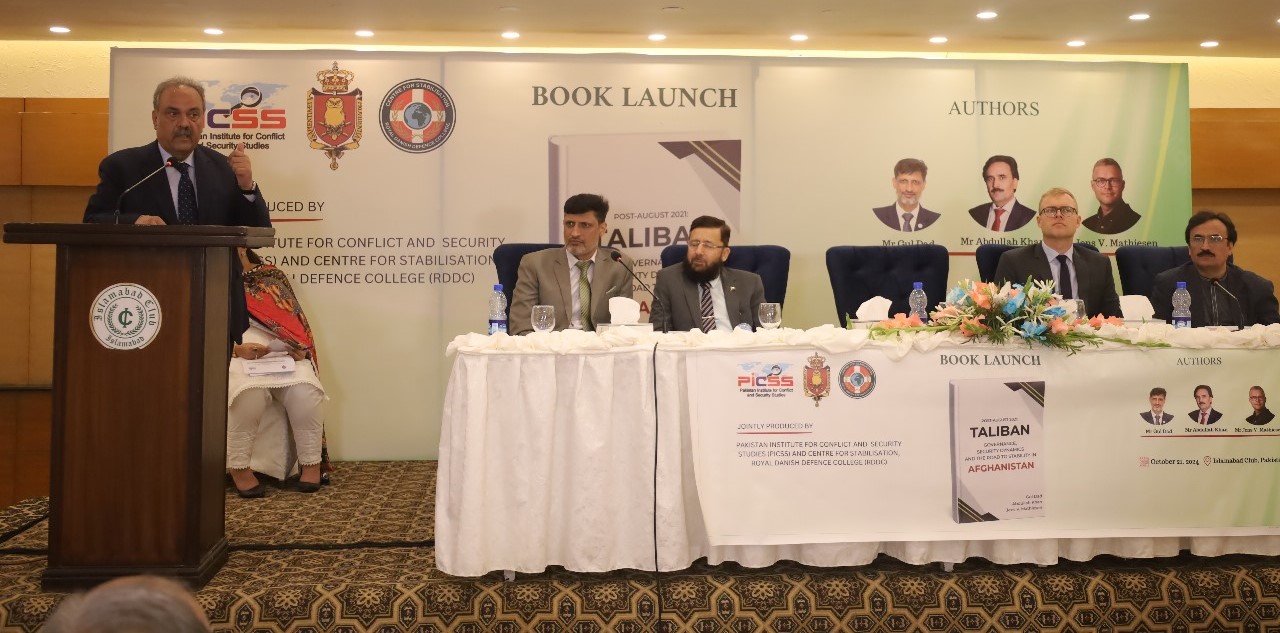ISLAMABAD ( WNAM REPORT): The Pakistan Institute for Conflict and Security Studies (PICSS), in collaboration with the Royal Danish Defence College, held the launch of their jointly produced book titled “Post-August 2021: Taliban Governance, Security Dynamics and the Path to Stability”. The event took place at Islamabad Club on Monday and brought together distinguished diplomats, academics, and security experts.
Ambassador Asif Durrani, Pakistan’s former special envoy for Afghanistan, delivered the keynote address, providing an insightful overview of Afghanistan’s evolving political landscape since the Taliban takeover in August 2021. The book, co-authored by Mr. Abdullah Khan, Managing Director of PICSS, Mr. Gul Dad, Director of Research at PICSS, and Mr. Jens Mathiesen, Special Consultant at the Royal Danish Defence College, delves into the challenges and developments in Taliban-led Afghanistan.
The event was presided over by Major General Muhammad Saad Khattak (Retd), Chairman of PICSS. The panel featured notable figures such as Norwegian Ambassador to Pakistan, Mr. Per Albert Ilsaas; Ms. Amina Khan, Director of the Centre for Afghanistan, Middle East & Africa (CAMEA) at ISSI Islamabad; and Pakistan’s former Ambassador to Afghanistan, Ambassador Ayaz Wazir. Together, they engaged in a lively discussion, reviewing the book’s findings and the implications of the Taliban’s governance on Afghanistan and the broader region.

Speakers at the event acknowledged that the Taliban have succeeded in bringing a semblance of peace and establishing their control over the country. However, they emphasized the ongoing security threats posed by the presence of militant groups such as Al-Qaeda, the Islamic State Khorasan Province (ISKP), and the Tehrik-i-Taliban Pakistan (TTP), which operate from Afghan soil. The consensus was that while these challenges remain significant, international engagement with the Taliban leadership is critical to preventing Afghanistan from falling into isolation once again.
The book also sheds light on the Taliban’s efforts to develop their military infrastructure, including the creation of an Army, Air Force, and Intelligence network under the General Directorate of Intelligence (GDI). Speakers and authors alike discussed whether the Taliban’s military buildup could pose a security threat to neighboring countries and beyond. The integration of the Taliban’s fighting forces into the Afghan Defense Forces, which are being developed around the concept of Jihad as a central recruitment principle, was also a point of discussion.
In his remarks, Norwegian Ambassador Mr. Per Albert Ilsaas commended the authors for their in-depth analysis and stressed the importance of understanding Afghanistan’s evolving security dynamics. Ms. Amina Khan and Ambassador Ayaz Wazir further highlighted the need for a nuanced approach towards the Taliban regime, urging continued diplomatic engagement to foster stability in the region.
The book, “Post-August 2021: Taliban Governance, Security Dynamics and the Path to Stability”, offers a detailed examination of the Taliban’s governance strategies, security challenges, and their implications for regional and global stability. It stands as a critical resource for policymakers, security analysts, and scholars working on Afghanistan and South Asia.


